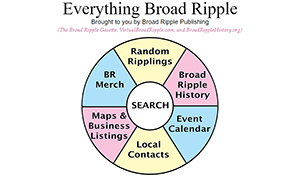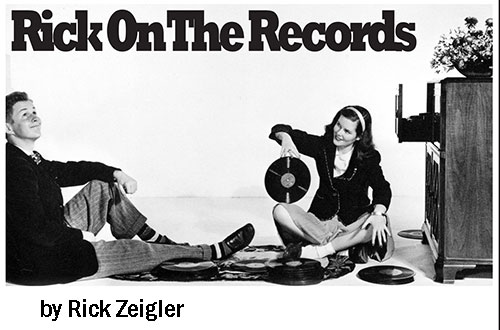
|
Broad Ripple Random Ripplings

The news from Broad Ripple
Brought to you by The Broad Ripple Gazette
(Delivering the news since 2004, every two weeks)

|
| Brought to you by: |

|

|

|

|

|

|
Converted from paper version of the Broad Ripple Gazette (v05n04)
Rick On The Records - by Rick Zeigler
posted: Feb. 15, 2008

RADIOHEAD-IN RAINBOWS
Radiohead's In Rainbows is a landmark album. Not because of the way it was initially distributed (more on that later), but because of the absolute quality of the album itself. It harkens back to the days when the biggest, most talented music groups on the planet would cement their iconic status by releasing a new album that could be seen as a step forward in their own work while, at the same time, being very different and inventive in comparison to the work of their contemporaries. In Rainbows is that type of album and its release makes it clear that Radiohead is that type of group. Warm and rocking, tender and angry, symphonic and spare, inviting yet full of alienation, all of these qualities can be found in nearly equal measure on In Rainbows. It is that balance that propels it into the top rank of this decade's releases. For example, Thom Yorke has always been an excellent purveyor of feelings of alienation. But on In Rainbows he is now able to express desire with skills equal to his expressions of estrangement. Johnny Greenwood's guitar playing, while always strong on hooks and anthemic qualities, now also encompasses moments of hushed tenderness and folk-like simplicity with equal skill. In Rainbows also showcases the under-appreciated drumming of Philip Selway. Nearly every song starts with a soft, usually syncopated beat accompanied by either a voice or an instrument. But those beats then mutate into whatever the song calls for, be it fierce rock punch or gentle percussive shadings. The overall effect of these combinations is to carry the listener through the range of emotions that Radiohead is expressing. And all this is done within 45 minutes. Songs do not outstay their welcome, but say their piece and then make way for the next. While there is experimentation in the air, no song relies solely on such for its impact. In Rainbows first two songs capture nearly all of these elements. "15 Steps" starts with a syncopated beat followed by Yorke's vocals. Then a beautifully melodic, yet muffled, electric guitar line enters. As the song builds, the drumming maintains the unsettling syncopation without sacrificing any drive. Crunching percussive sound effects add to the mood, as does a wobbly church-like keyboard abetted by simple guitar hooks. "Bodysnatchers" follows this with a straight-ahead beat and beautiful spare guitar lines, as well as plenty of understated "ooh-ahh" vocalizing from Yorke. The song then churns into a fierce, full-on rocker with overlapping lead lines and Yorke's powerful wails. Further songs continue, each with their own distinct character but all sounding like the work of a group completely in tune with its own strengths (and probably weaknesses as well-note the brevity of the songs here). In sum, this writer thinks that In Rainbows in Radiohead's strongest musical statement yet. It may not have the transformative power that OK Computer had upon its release, but this album will last for years as a statement of just how good this group is.
Ah, but what of the transformative implications of its distribution, wherein In Rainbows was initially released (way back in early October) only as a download, and one where the buyer could name his or her own price? There is little doubt that future artists will increasingly take advantage of this model. But one also needs to look at Radiohead's own statements on the matter before we get too carried away. Such a release strategy definitely helps combat the unauthorized, leaked distribution of new works. It allows the artist to capture some of the available rewards for their work by doing the "leaking" (being on the internet before being in the stores) themselves. But even Radiohead have confirmed that they were always planning to release the album on CD/vinyl, AND THAT THEY ANTICIPATED THEIR FANS WOULD STILL BUY IT in these formats and not limit themselves to the inferior sound quality of digital downloads (compression takes its toll on sound quality). Sales to date seem to validate their point. This is a good reminder of how the internet used to be talked about as the "information superhighway". When it comes to quality of listening experience of digital downloads, this seems to be a valid metaphor. The transportation superhighway makes it much quicker and convenient to get to your destination, but what is sacrificed is the wealth of detail experienced by traveling on the slower, less convenient existing roads. Similarly, the internet allows for a quick, convenient way to get and experience music, but there is much detail lost by relying on this as the only vehicle for listening. Higher quality download files are surely yet to come, but compressing files to make them transportable may always be a factor. Thus, for those who LIKE music, the internet may be the perfect vehicle for them to get it, but for those who LOVE music, its imperfections are all too apparent (many make the same argument when comparing CDs to vinyl). This does not, however, lessen the problems for major label record companies. Such companies have transformed themselves from focusing on giving music LOVERS what they want (an easier focus to maintain when the companies were, themselves, controlled by fellow music lovers) to focusing on music as a mass-market commodity, which means tying their existence to selling hundreds of thousands of copies to people who only LIKE music. Indeed, the industry often cites Michael Jackson's Thriller as the template for what makes a record company profitable. Not that Thriller is a bad album musically. But no one can really think that its massive success was based on sales to music lovers. Rather, it was based on sales to the more casual fan. It is that fan that the internet serves well, and it is for that reason that big record companies may have an unsolvable problem on their hands. Long live the smaller, music-loving labels.
Rick Zeigler, along with his wife, Jeanne, owns Indy CD and Vinyl at 806 Broad Ripple Avenue. Back in his musician days, his band opened for the likes of U2, XTC, Gang Of Four, The Pretenders, Los Lobos, and, um, Flock Of Seagulls, among others. You can read all of Rick's reviews at www.indycdandvinyl.com. Email your music questions and comments to rick@BroadRippleGazette.com
rick@broadripplegazette.com

|

|

|
| Brought to you by: |

|

|

|
| Brought to you by: |

|

|

|
| Brought to you by: |

|

|

|
| Brought to you by: |


